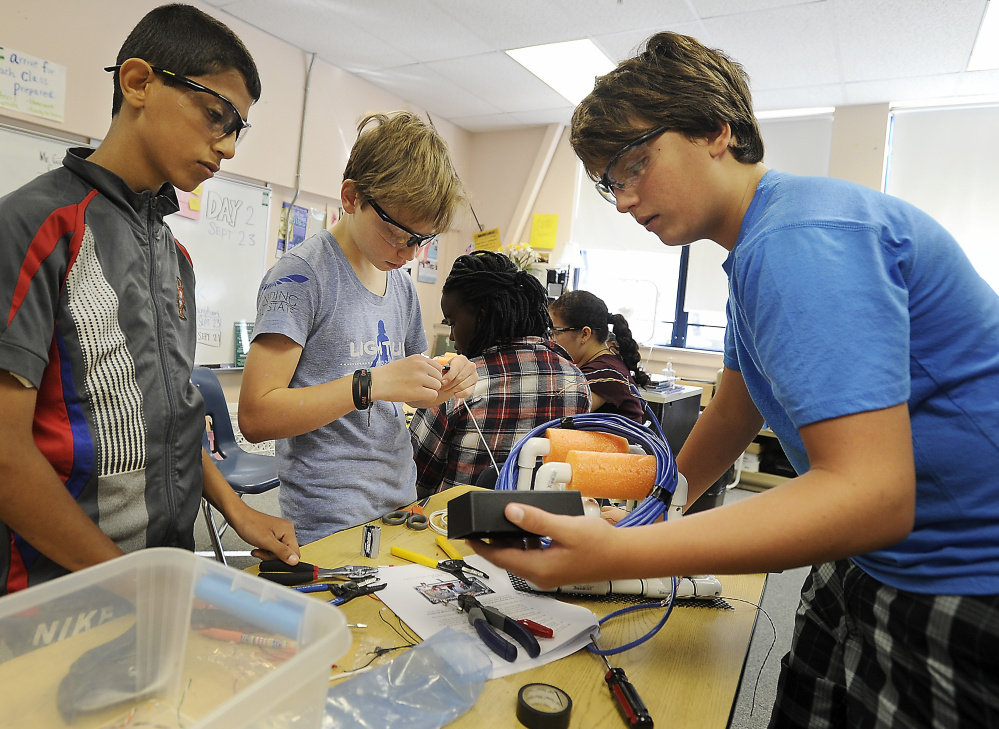Students today have grown up with climate change as fact. Recycling is second nature. Eating organic or vegetarian is hardly unusual. Electric cars, solar panels, low-flow shower heads and reusable shopping bags are the norm.
That means students in Maine’s K-12 classrooms today have moved way beyond planting beans in the school garden and throwing cans in the recycling bin.
Across the state, students are launching ambitious alternative energy projects, building underwater devices to combat invasive species, studying water quality in the Gulf of Maine and raising worms to create rich compost.
“So many amazing things are happening right now,” said Olivia Griset, the president of the Maine Environmental Education Association.
It’s not only that students today are more open than ever to hear and understand a message of sustainability. It’s also because modern teaching models value hands-on, engaging programs that deal with real-world issues.
“It’s a very successful model,” Griset said. Schools are also increasingly partnering with environmental education groups, such as Wiscasset-based Chewonki, a 100-year-old environmental education foundation or the Ferry Beach Ecology School, that have created entire education programs (See Meet, page S2).
“They’re not just doing some drop-in, one-off afternoon program,” Griset said. “They do these really well-integrated, well-thought-out, long-term curriculum.”
A more sophisticated curriculum works because Maine students come to their classrooms with a working understanding of many environmental issues.
“Kids in Maine are surrounded, whether they are tuned in or not, to the conversation about lobster, or the conversation about cod, or they’re living it in their home,” said Leigh Peake, chief education officer at the Gulf of Maine Research Institute.
“I think they are aware, in a way I was not, of the broader ecological dynamics going on around them,” she said. “There is a new level of sophistication in their questions. Instead of asking a ‘what is this?’ kind of question, they are asking a ‘why is this?’ sort of question.”
Maine’s deep cultural and economic ties to the environment also play a role, Griset said. Tourism is the state’s largest industry, L.L. Bean its signature retailer.
“It’s a place where people value the environment. It supersedes some of the traditional political issues. Because of that connection, there’s a feeling that where we live is important for our children and our next generation,” Griset said.
In the 1960s and 1970s, saving the environment and saving energy penetrated the American consciousness. Young people led those movements, Peake said.
“Kids drove the recycling movement,” she said. “I think they are out there still with that native passion they have about the Earth and their world.”
The very youngest students, especially, are very earnest in wanting to learn – and in embracing new ideas, one elementary school teacher said.
“Our job is to follow that curiosity, that earnestness,” said Henry Ingwerson, who teaches third grade at Wells Elementary School. “I think kids are really inclined to care. We have to shape it for them. That’s our responsibility as educators.”
Copy the Story Link
Send questions/comments to the editors.




Success. Please wait for the page to reload. If the page does not reload within 5 seconds, please refresh the page.
Enter your email and password to access comments.
Hi, to comment on stories you must . This profile is in addition to your subscription and website login.
Already have a commenting profile? .
Invalid username/password.
Please check your email to confirm and complete your registration.
Only subscribers are eligible to post comments. Please subscribe or login first for digital access. Here’s why.
Use the form below to reset your password. When you've submitted your account email, we will send an email with a reset code.